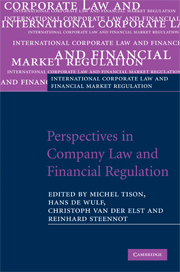Book contents
- Frontmatter
- Contents
- List of contributors
- Foreword
- PART I Perspectives in company law, SECTION 1: European company law: regulatory competition and free movement of companies
- PART 1 Perspectives in company law, SECTION 2: Corporate governance, shareholders' rights and auditing
- 9 Stakeholders and the legal theory of the corporation
- 10 The renaissance of organized shareholder representation in Europe
- 11 In search of a middle ground between the perceived excesses of US-style class actions and the generally ineffective collective action procedures in Europe
- 12 Some modest proposals to provide viable damages remedies for French investors
- 13 Pre-clearance in European accounting law – the right step?
- 14 International standards on auditing and their adoption in the EU: legal aspects and unsettled questions
- 15 Corporate governance: directors' duties, financial reporting and liability – remarks from a German perspective
- 16 Some aspects of capital maintenance law in the UK
- 17 Luxembourg company law – a total overhaul
- 18 Role of corporate governance reform and enforcement in the Netherlands
- PART 1 Perspectives in company law, SECTION 3: Takeover law
- PART II Perspectives in financial regulation, SECTION 1: European perspectives
- PART 2 Perspectives in financial regulation, SECTION 2: Transatlantic perspectives
- PART III Miscellaneous
- Index
- References
18 - Role of corporate governance reform and enforcement in the Netherlands
from PART 1 - Perspectives in company law, SECTION 2: Corporate governance, shareholders' rights and auditing
Published online by Cambridge University Press: 04 August 2010
- Frontmatter
- Contents
- List of contributors
- Foreword
- PART I Perspectives in company law, SECTION 1: European company law: regulatory competition and free movement of companies
- PART 1 Perspectives in company law, SECTION 2: Corporate governance, shareholders' rights and auditing
- 9 Stakeholders and the legal theory of the corporation
- 10 The renaissance of organized shareholder representation in Europe
- 11 In search of a middle ground between the perceived excesses of US-style class actions and the generally ineffective collective action procedures in Europe
- 12 Some modest proposals to provide viable damages remedies for French investors
- 13 Pre-clearance in European accounting law – the right step?
- 14 International standards on auditing and their adoption in the EU: legal aspects and unsettled questions
- 15 Corporate governance: directors' duties, financial reporting and liability – remarks from a German perspective
- 16 Some aspects of capital maintenance law in the UK
- 17 Luxembourg company law – a total overhaul
- 18 Role of corporate governance reform and enforcement in the Netherlands
- PART 1 Perspectives in company law, SECTION 3: Takeover law
- PART II Perspectives in financial regulation, SECTION 1: European perspectives
- PART 2 Perspectives in financial regulation, SECTION 2: Transatlantic perspectives
- PART III Miscellaneous
- Index
- References
Summary
Introduction
As the recent wave of governance scandals and reforms has focused the public debate on how publicly held corporations should be structured and organized, it is hardly surprising that corporate governance of listed companies has captured the legal imagination. Books, articles and reports on the corporate governance of listed companies abound. Corporate governance reforms in developed countries as well as emerging markets are high on the policy agendas. Proposals have arisen to change, among other things, the role of non-executive directors, executive pay, disclosure, the internal and external audit process, and sanctions on director's misconduct. Suggestions have also been advanced to create new standards of integrity for auditors, analysts and rating agencies. Policymakers and lawmakers are prompted to design measures to protect shareholders from fraud, poor board performance and auditor failure. These most notably include CEO and CFO certification of accounts, imposition of internal controls, the prohibition of company loans to managers and the requiring of firms to establish an independent audit committee.
While the question of the economic effect of the corporate governance regulation on the performance of listed companies has become a leading concern for both lawmakers and investors, the evidence, however, is mixed. On the one hand, it is widely acknowledged that corporate governance rules and standards promote efficiency, transparency and accountability within firms, thereby improving a sustainable economic development and financial stability.
- Type
- Chapter
- Information
- Perspectives in Company Law and Financial Regulation , pp. 322 - 342Publisher: Cambridge University PressPrint publication year: 2009
References
- 1
- Cited by



